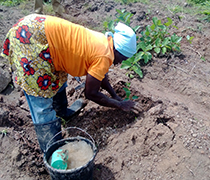Plantation forests reduce pressure for illegal logging
 Miro Forestry Company is promoting sustainable forest use in Africa by establishing plantation forests in Ghana and Sierra Leone. The company sells the wood it produces on local and regional markets.
Miro Forestry Company is promoting sustainable forest use in Africa by establishing plantation forests in Ghana and Sierra Leone. The company sells the wood it produces on local and regional markets.
West African demand for wood – for construction, fuel, etc. – is steadily rising. Poor monitoring of natural forests and the lack of sustainably grown plantation forests have led to extensive illegal logging.
The arrival of players like Miro in the timber market is important for protecting dwindling natural forests by improving the availability of trees from verified legitimate sources.
By the end of 2014 Miro had planted 1,800 hectares of forest. It aims to plant 1,500 hectares annually in the years ahead.
The company has made long-term leasing agreements with private landowners and the government for a total of some 30,000 hectares of land. Diligent assessment of environmental and social impacts is another part of its preparations.
It directly employs about 350 people but its influence extends much farther. In West Africa the average wage earner supports five family members.
The company also trains local farmers in the use of more sustainable agricultural methods. In Ghana it has been involved in building a local vocational school, too.
Finnfund has provided Miro with an early-stage project preparation grant, for commissioning a report from Pöyry consultants about the end market. This helped to place the company’s business plan on a more concrete footing.
Finnfund and the British development finance institution CDC Group have shareholdings in Miro.
Photo: Miro Forestry Company

